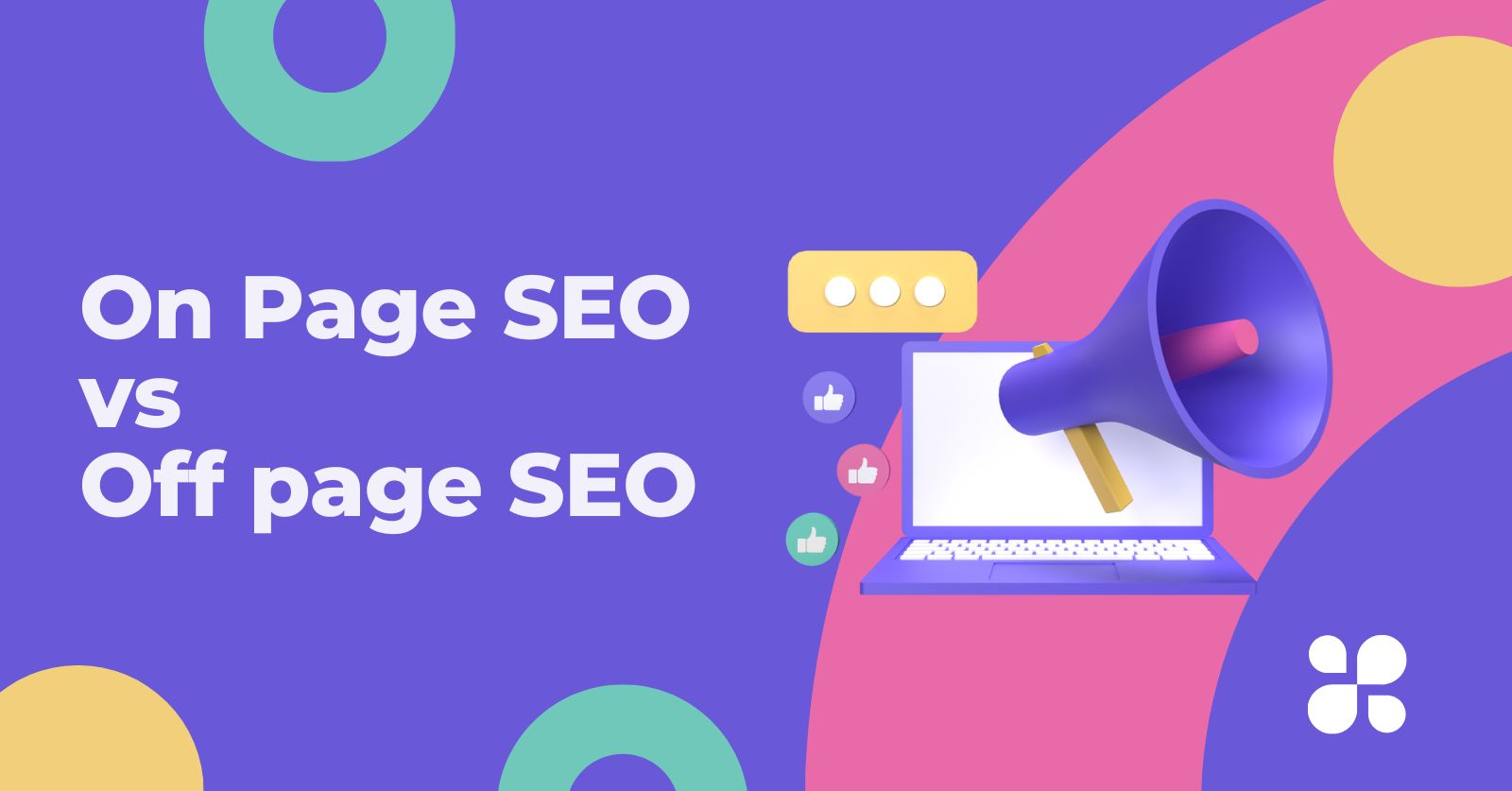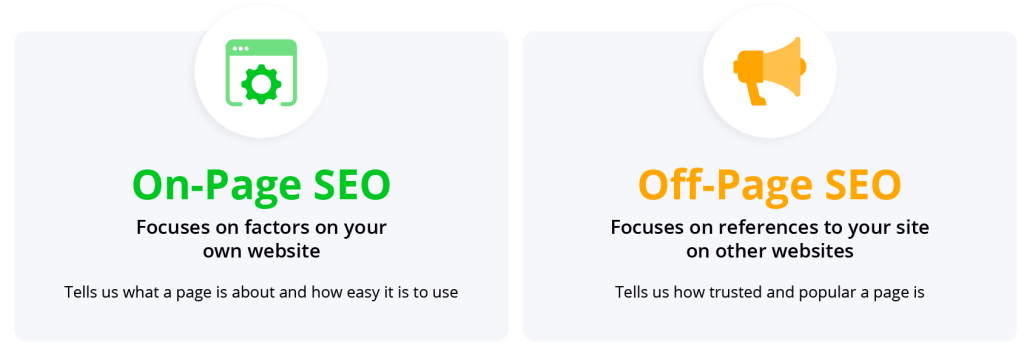
On Page SEO VS Off Page SEO: What You Need To Know
Welcome to the world of SEO, You may have heard , there are two main “categories” of SEO — on page and off page. When you understand the foundations of these distinct optimization types, you’ll be able to develop a comprehensive and balanced SEO strategy.
Beginners may find Search Engine Optimization (SEO) difficult because it is a challenging and constantly changing field. Knowing where to begin with over 200 ranking variables and constantly changing ranking algorithms by search engines can be difficult. Today we will dive into the fascinating topic of On page SEO vs off page SEO.
These are two essential strategies to boost a website’s visibility and credibility on search engines. On page & off page SEO have one common goal: to improve the website’s ranking on the Search Engine Results Pages (Google’s SERP), but they differ in several ways. So, let’s begin with the basics before diving into the debate on page vs off page seo!
What is On page SEO?
On page SEO refers to the techniques and strategies used to optimize the content and structure of a website to improve its ranking on search engine results pages (SERPs). By implementing effective on page SEO techniques using the best on page SEO tools, a website can improve its visibility, increase organic traffic, and drive more conversions.
Elements of On page SEO:
1. Keywords:
In search engines, keywords are words and phrases that people use to find information. Using relevant keywords in the website’s content and meta description & meta tags can help search engines understand what the website is about and improve its ranking.
2. Website Structure:
The structure of a website, including its layout, navigation, and organization of content, can have a big impact on its search engine rankings. A well-structured website makes it easy for users and search engines to find and access the necessary information.
3. Mobile-Friendliness:
With more and more people using mobile devices to access the internet, websites must be mobile-friendly. Google now uses mobile-first indexing, which means it crawls and indexes the mobile version of a website first.
4. Page Speed:
The speed at which a website loads can greatly impact its search engine rankings. Search engines favor websites that load quickly and provide a good user experience.
5. Content:
High-quality, unique content is crucial for on page SEO. Not only does it help search engines understand what a website is about, but it also helps to establish the website as an authority in its field.
5. Meta tags:
These are special tags that provide information about a webpage to search engines. They help define the title and description of the webpage on the SERP. They can be analyzed using a meta tags analyzer.
6. Sitemap:
A sitemap is a file that lists all URLs on a website, making it easier for search engines to crawl and index the site.
7. URLs:
The structure of a website’s URLs can also impact its search engine rankings. They should be easy to read, include relevant keywords, and be organized logically.
8. Schema Markup:
Schema markup is a code added to a website to help search engines better understand the content on the site. It can be used to provide information about the website’s content, such as the name, address, and phone number of a business or the date a blog post was published.
9. Internal Linking:
Internal linking is the practice of linking to other pages on the same website. It helps search engines understand the organization of the website and can improve the website’s visibility and PageRank.
10. Social Media Integration:
Social media integration is the practice of including social media sharing buttons and links on a website. This can improve the website’s visibility and credibility on social media platforms and drive more traffic.
11. Analytics:
Installing web analytics on a website can help track important data about the website, such as the number of visitors, the pages they visit, and how they interact with the site. This information can help improve the website’s performance and usability.
It’s important to note that SEO is a continually changing and evolving field. As search engines refine their algorithms and new technologies emerge, the best practices for on page SEO are subject to change. Therefore, website owners should stay up-to-date on the latest developments in SEO and adjust their on page SEO strategy as needed.
What is Off page SEO?
Off page SEO refers to the techniques and strategies used to improve the visibility and credibility of a website by building links from external sources. These external sources can include other websites, social media platforms, and online directories. Off page optimization is focused on building a reputation and authority for a website through external sources.
Elements of Off page SEO:
1. Backlinks:
Backlinks are links from other websites to a website. Search engines consider the number and quality of backlinks when determining a website’s search engine ranking.
2. Social Media Promotion:
Social media promotion can help drive more website traffic and establish authority and reputation.
3. Online Directories:
Submitting a website to online directories can improve its visibility and credibility.
4. Brand Mentions:
Getting mentions of a website or brand on other websites or social media platforms can also help to establish authority and reputation.
5. Influencer Outreach :
Collaborating with influencers to promote a website can drive more traffic and establish authority and reputation.
6. User Generated Content:
User-generated content, such as reviews and comments, can also have an impact on off page SEO. Search engines consider user-generated content when determining a website’s credibility and authority.
7. Local SEO:
Local SEO refers to the strategies and tactics used to improve a website’s visibility in local search results. This includes things like listing a business in online directories and getting reviews from local customers.
8. Referral Traffic:
Referral traffic refers to the traffic that a website receives from external sources such as social media or other websites. Websites with high referral traffic will have better off page SEO than those with low referral traffic.
9. Domain Authority:
Domain authority is a metric that measures the overall strength and popularity of a website. Websites with high domain authority will have better off page SEO than those with low domain authority.
10. Online Public Relations (PR):
Online Public Relations (PR) is promoting a website or brand through media coverage, press releases, and other forms of online media.
11. Social Bookmarking:
Social Bookmarking is sharing and saving links to a website on social bookmarking sites such as Delicious, Digg, and Reddit. This can help to increase visibility and drive more traffic to a website.
12. Guest Blogging:
Guest blogging is the practice of writing and publishing articles on other websites in order to increase visibility and build backlinks.
It’s worth noting that off page SEO is a longer-term strategy, as building backlinks and reputation takes time, effort, and consistent work. It’s also important to focus on building high-quality, relevant links from reputable sources rather than many low-quality links, as search engines may penalize manipulative tactics.
Major Differences: On Page SEO vs Off Page SEO

| Factors | On Page SEO | Off Page SEO |
|---|---|---|
| Focus | Focuses on optimizing the content and structure of a website. | Focuses on building website’s reputation & credibility via external sources. |
| Control | It can be more easily controlled by website owners | Difficult to control as it relies on the actions of external sources. |
| Content | Focuses on optimizing the content of a website for search engines, ensuring high quality, unique content | Focuses on building a website’s reputation and authority through external sources |
| Technical factors | Includes technical factors such as website structure, URLs, and site speed that can impact the usability of a website. | Includes the external link that a website receives, the quality of that links, and social media signals. |
| Time Frame | An ongoing process that should be regularly updated to reflect changes in search engine. | Takes longer to build a reputation and authority through external sources. |
| Impact on SEO | Directly impact a website’s search engine ranking. | Plays a role in search engine ranking via the number and quality of backlinks. |
| Short term vs long term | Have short-term effects on a website’s search engine ranking. | A long-term strategy, can take months or even years to bear fruit. |
| Budget | Can often be done with a small budget by making changes to the website’s content and structure. | It requires a larger budget, involving outreach and paid promotion to build backlinks and establish authority. |
Which is more important?
Both on page SEO and off page SEO are important for a website’s search engine visibility, and they should be used together for the best results. On page SEO is essential for ensuring that a website’s content is relevant, well structured, and easily understandable for search engines and users. It helps search engines understand what a website is about and how relevant it is to a particular search query. On page SEO can directly impact a website’s search engine ranking.
On the other hand, off page SEO focuses on building a website’s reputation and authority through external sources such as backlinks and social media promotion. Off page SEO helps search engines understand the reputation and authority of a website, which can influence the search engine ranking of that website. It also plays a role in driving traffic to the website and building brand awareness.
Let’s Conclude:
In conclusion, on page SEO vs off page SEO is not a debate as both are crucial for a website’s search engine visibility. On page SEO helps optimize the website for both search engines and users, whereas off page SEO helps establish a website’s reputation and credibility through external sources. Both are essential for a website’s overall search engine ranking and visibility.
Let’s dive in! Get started for free
